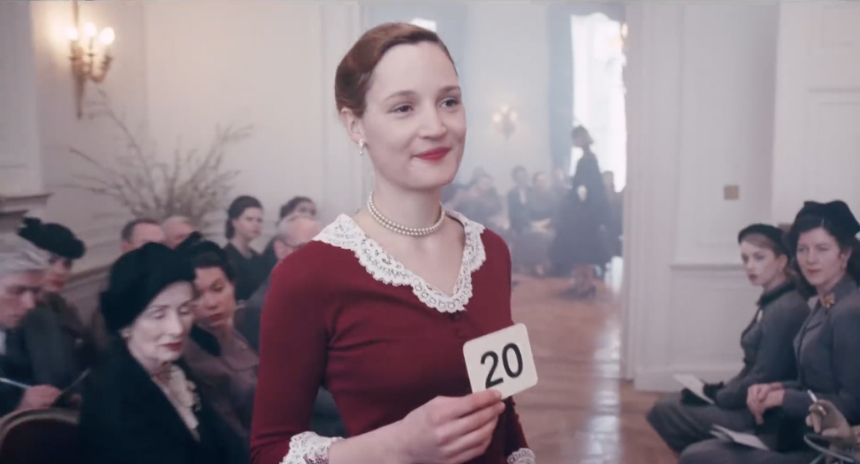Review: PHANTOM THREAD Exquisitely Unravels Genius

In terms of the last three films crafted by the greatest showman in cinema, P.T. Anderson, in which I include his latest - dare I say - masterpiece, I’m fairly distrusting of reviews conducted after a single screening. And yet, that is exactly what I’m nevertheless delighted to be tasked with achieving today.
There aren’t many filmmakers operating on this dense a level - the works of Stanley Kubrick and David Lynch come to mind - but films like The Master and Inherent Vice are the best kind of heady cinematic riddles; wherein each layer is meticulously constructed to offer distinctly nuanced energies. Many will, and have, countered this argument by saying films shouldn’t require three admission tickets in order to catch an idea of the picture being painted. For many, trying on Phantom Thread will be like wearing an ill-fitting dress. Others, more game for the challenge of taking on the dressmaker, will go the extra mile to appreciate the encrypted messages sewn into his creations’ inner linings.
Less than a riddle, Phantom Thread is a poem to be unravelled. Deciphering which thread in the subtext is capable of wholly undoing the foundation of the film’s norm amounts to why we see P.T. Anderson films nowadays, as the wunderkind only grows older, wiser, and aesthetically stronger. That and, oh, I don’t know, the pristine, brilliantly suggestive cinematography, the performances so clearly arrived at tirelessly, the Kubrickian detail and overall beauty culminating from every morsel of every frame, the intricate compositions of Jonny Greenwood that teeter along a precarious psychological ledge, and, of course, the poetically evocative dialogue that frames the film between the lines.
So what is Phantom Thread ‘about’? It is about a brilliant, esteemed dressmaker in 1950s London who lives a life of regimented genius. With great care and value placed in ritual, Reynolds Woodcock lives in a sponsored house that, with the help of an army of best-of-the-best seamstresses, wholly function to keep the machine running smoothly, even if it means adhering to every indulgence of the house-master’s will. Luckily, Reynolds is a good man, and all that he really requires is fascistic silence and total subordination from his underlings.
One day, Reynolds becomes smitten by Alma, an instant muse he invites into his life, laying the seeds for an inevitable disruption of his strict routine. Alma, beguiled by the act of literally wearing a gifted artist’s vision of beauty - encompassing it - can’t help, but fall helplessly under his thumb. Reynolds’ careful lifestyle leaves no room for love and the natural born bachelor, desired by all, wishes to seek companionship on his terms only. Anyone who dares to expect more from him is promptly shown the door by Reynolds’ right hand woman, his sister Cyril, the living embodiment of a model presence in his life. But Alma is different. After a time of subservience, she dares to challenge the paradigm in search of a little reciprocity. Wishing to be rewarded for offering Reynolds the vital spark he thrives off of Alma seeks a relationship defined on mutual terms. Reynolds is uncertain as to whether Alma is a blessing or a curse; suffice it to say, tension ensues.
So what is Phantom Thread about? Without spoiling the finer points, I can say that it is not about dresses, per se... though maybe that’s exactly what it’s about . Given that P.T.’s films have never before concerned artist protagonist, or the act of creating art - though I’m already fielding imaginary defenses for the Boogie Nights argument - it’s tempting to call Phantom Thread his most personal film to date. Early in the story, Reynolds expresses that the notion of dead relatives looking down from the beyond isn’t a creepy one to him, but actually provides comfort. I don’t think it’s reaching to consider Anderson’s sadness regarding his gone-too-soon father, a significant influence in his life, who is perhaps nowhere better explored than in Hard Eight, who never lived to see the heights his son would reach in this world us film lovers covet so dearly.
Thus, Phantom Thread is about an ornery artist who let’s love into his castle, thereby disrupting the careful process of a delicate genius, as the act of manifesting genius is surely a delicate endeavour. It’s about the balance of personal aspiration vs familial ambitions of a life shared with another, enchanted by love. Phantom Thread raises the question, is it possible to have your cake and eat it too? Or, to put it in the words of Bob Rafelson, is it better to stay hungry? At the end of the day, is it the dress that counts or the soul that inspired it? Is it happiness or posterity - or can the two coexist? What is love if not a collaboration, and what is collaboration if not a compromise - a middle ground? These are questions Anderson’s latest, yes, masterpiece circles around and gothically exaggerates in ways I can’t begin to enthuse.







